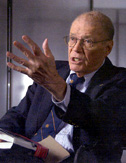
Movie Guru Rating:

Comment
on this review
| |

TMcNamara, Morris attempt to deal with the past
by Jack Neely
Robert Strange McNamara is a lonely misfit in American history. He was hated by the hippies, who saw him as the architect of the Vietnam War; but he was distrusted as a pessimist by the war hawks, including President Johnson, who eventually nudged him out of the cabinet.
In spite of an impressive resume as veteran officer and auto executive, he never quite seemed like a Secretary of Defense. He never even seemed like a grown man. At public appearances having to do with the war, even those in Vietnam itself, the well-scrubbed, round-faced Secretary kept up his bland smile, like a self-consciously polite little boy at a grownup’s birthday party.
Still, some believe McNamara, one of the alleged “Best and the Brightest” of John Kennedy’s original cabinet, to be one of the smartest men who ever held his post. He was sometimes called an arrogant dictator, Mack the Knife, “an IBM machine with legs,” but now, on camera, he weeps; and he remembers the name and the story of the Quaker demonstrator who immolated himself beneath McNamara’s Pentagon window.
The Fog of War may be the closest we get to the paradox that was, and is, Robert McNamara. It’s literally a documentary, and of course just won director Errol Morris the Academy Award in that category. And, like many documentaries, it’s based on extensive on-camera interviews conducted with an old man in a blazer and tie in a gray room; but it has the feel of a taut thriller, with a suspenseful score by Phillip Glass and frequent departures to other times and places via audio and video footage of World War II and Vietnam, much of it so well restored it doesn’t seem historical.
If it weren’t a documentary, you might question the casting: This nerdy guy with the smile of a fraternity pledge is not the guy you’d pick to portray the leader who directed what is still, at this writing at least, the most controversial war in U.S. history.
At 85, McNamara is unslowed by age, quicker than most grad students. It’s startling to realize what this man, whom we associate almost entirely with the 1960s, remembers. He claims to remember Armistice Day in 1918, and President Wilson’s declaration of the end of the war that would end war forever.
We hear about Vietnam, but before we do, we hear unnerving revelations about another war we’re inclined to think of in purely heroic terms. McNamara talks with surprising frankness about the U.S. decision to kill thousands of Japanese civilians in massive firebombings of 67 Japanese cities and towns months before Hiroshima. When he quotes General Curtis LeMay’s comment that, “If we’d lost, we’d be prosecuted as war criminals,” McNamara adds, “And I think he’s right.” The question of why the only leaders who face war-crimes charges are the defeated ones is one of several unsettling questions The Fog of War raises. Our civilization, McNamara says, hasn’t learned to deal with the real consequences of war.
Vietnam dominates the movie, of course. McNamara’s revelations about what the military knew and what they let on will be the basis for a million I-told-you-so’s.
The movie is a wrestling match. McNamara is clearly exploiting the occasion to square some accounts about the war, and to come across as a generally reasonable and sensitive guy, which he may well be. Tapes of McNamara discussing Vietnam with Kennedy and Johnson make him seem like a level-headed sort who’s reluctant to venture into the thickets of Vietnam without knowing the way out.
However, McNamara admits he sees war as an inevitable state among human beings, and, at points, he implies that the only way to wage it is ruthlessly. One of the 11 “lessons” that give the movie its structure is, “In order to do good, you may have to engage in evil.” The director tries to get him to accept some guilt for the carnage of the war; McNamara stops short of that.
Most Americans see the Vietnam War in primary colors. After all these years, most of us are still furious at one side or the other, the “warmongers” or the “peaceniks.” McNamara wouldn’t be welcome at anybody’s dinner party; he would argue with all the truisms we’ve trained ourselves to believe.
Any review of The Fog of War is incomplete. The film will be different for every viewer, colored by his or her own experiences with war. And any viewing of it at Downtown West will be affected by the people who are watching it with you. When I was there for a matinee, a man across the aisle who looked the right age to be a Vietnam vet responded to some of McNamara’s defenses with a rude and unprintable noise. Meanwhile, a lone woman behind me wept.

March 4, 2003 * Vol. 14, No. 10
© 2000 Metro Pulse
|





